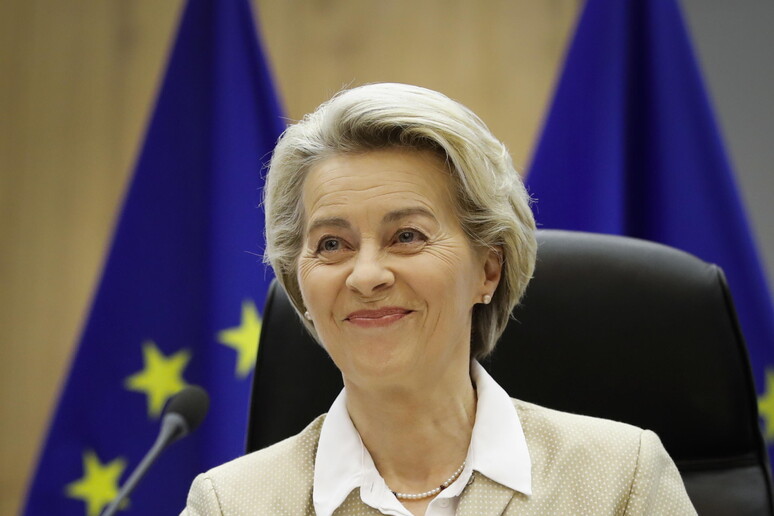(by enr correspondents)
This week, the European Commission
unveils its plans to reform the electricity market and boost
Europe's competitiveness with a clean tech plan. The European
Newsroom spoke with Ursula von der Leyen ahead of the proposal.
Consumers at the reform's heart.
According to European Commission President Ursula von der Leyen,
consumers are the main beneficiaries of the reform of the
European electricity market, which was proposed in Strasbourg on
Tuesday. "At the heart of this reform are consumers," von der
Leyen said in an interview with agencies from the European
Newsroom on Monday, adding that the proposed reform of the
electricity market would "drastically reduce the impact of gas
prices on the price of electricity."
"A fundamental objective of the reform is to bring the benefit
of the low cost of renewables to consumers," von der Leyen
stressed. The European Commission wants to reform the
electricity market to prevent skyrocketing prices for consumers
and promote the expansion of renewable energies. Electricity
prices had risen extremely last year. One of the reasons for
this was that at times around half of France's nuclear power
plants were out of action. In addition, the rise in electricity
prices was a result of much higher gas prices due to the Russian
war of aggression on Ukraine.
The head of the European Commission said that the "intraday
[electricity] market works well, but we have to improve on
long-term contracts." Wholesale prices on the electricity market
change from hour to hour, depending on supply and demand. At
times of low demand, for example at night, prices are lower
because electricity from renewable sources is sufficient to meet
demand. And production costs from renewable sources are very
low. In times of peak demand, however, the output of nuclear
plants, coal-fired thermal power plants and gas power plants has
to be added as well. The price of electricity is determined at
all times by the last producer to be added to the chain, for
instance gas-fired power plants. Therefore, some EU countries
have been asking for months to redesign the wholesale
electricity market so that the price of gas is decoupled from
the price of electricity.
However, the decoupling of gas and electricity prices, as
suggested by President Ursula von der Leyen in recent months, is
not included in the proposal. Instead, the European Commission
left the current system unchanged, maintaining that the proposed
reform will encourage a phase-out of fossil fuels and reduce
their impact on electricity prices.
Under the new proposal, state subsidies for new investments in
wind farms, solar energy, hydropower, geothermal energy and
electricity from nuclear energy are implemented through two-way
"Contracts for Difference, long-term buy-sell agreements."
Long-term contracts for power generation from renewable energies
and nuclear power are to be promoted in particular, according to
the proposal presented by the European Commission in Strasbourg
on Tuesday. The Commission also wants to encourage private and
public investment in renewables and nuclear power.
EU member states have yet to agree.
Von der Leyen is counting on the EU member states and the
European Parliament to conclude negotiations on the new proposal
by the time of the European elections in May 2024. This, she
said, has been well thought out and intensive consultations have
been held with experts. "That's why I think it's worth working
hard to get it ready before the European elections."
According to a press release from the Slovenian Ministry of the
Environment, Climate and Energy, the proposal does not yet
adequately address some other aspects of high energy prices that
member states discussed as part of emergency measures last year.
These challenges are the liquidity of electricity suppliers and
measures to prevent speculative trading. Another challenge is
recognizing the role of investments that facilitate a transition
from coal to gas.
Unlike France and Spain, for example, the German government is
likely to welcome the fact that the EU Commission is foregoing
quite far-reaching changes for the time being. Germany, together
with countries such as the Netherlands, Denmark and Luxembourg,
had recently repeatedly warned against a hasty reform.
When asked if the Commission supports the use of nuclear energy
to achieve the set climate goals, von der Leyen said that "the
type of energy mix with which each member state wants to achieve
the climate objectives depends on them." France is pushing for
the recognition of nuclear power as a low-carbon energy source,
with Germany as one of the main opponents. Von der Leyen added
that it is important to stick to the jointly established goals
of climate neutrality by 2050 and reducing greenhouse gas
emissions by 55 percent by 2030.
Reducing dependence on China.
Speaking about the EU's relations with China, von der Leyen said
on Monday that "for the European Union [it] is important to
de-risk but not to decouple from China. De-risk means we do not
want the dependency we experienced with Russia and fossil fuels.
We do not want dependency, for example, on critical raw
materials, and therefore we are diversifying and we are
strengthening our supply chains with like-minded partners."
At the same time, according to the President of the Commission,
it is important to cooperate in mitigating climate change, to
limit global warming and to ensure equal market conditions for
all. "Therefore, we want our companies to have access to the
Chinese market, we want transparency in terms of subsidies and a
clear commitment to respecting intellectual property," she said.
(continues).
ALL RIGHTS RESERVED © Copyright ANSA











